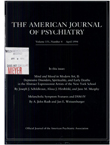Relapse after cognitive behavior therapy of depression: potential implications for longer courses of treatment
Abstract
OBJECTIVE: The authors studied the risk of relapse among depressed patients after cognitive behavior therapy in order to document the need and potential indications for longer-term models of treatment. METHOD: Forty-eight patients with major depression who responded during a 16- week course of cognitive behavior therapy entered a 1-year prospective follow-up study, as did two patients who received 20 weeks of therapy. Standardized, independent clinical assessments were completed 1, 3, 6, 9, and 12 months after treatment. Relapse was defined as, at minimum, a 2-week period in which the subject met the DSM-III-R criteria for major depression and had a Hamilton depression scale score of 15 or more. RESULTS: Sixteen patients (32%) relapsed during the 1-year follow-up. Correlates of relapse included a history of depressive episodes, higher levels of depressive symptoms and dysfunctional attitudes, slower response to therapy, and being unmarried. Patients who fully recovered during therapy (Hamilton depression score of 6 or less for 8 weeks or more) were at significantly lower risk for relapse than those who partially recovered (9% and 52%, respectively). Slower response to therapy, unmarried status, and high residual scores on the Dysfunctional Attitudes Scale were independently and additively related to increased risk of relapse. CONCLUSIONS: These findings provide further evidence of a relation between residual symptoms and relapse after cessation of active treatment. The authors strongly recommend that models of longer-term psychotherapy be developed for depressed patients who do not recover fully during time-limited cognitive behavior therapy.
Access content
To read the fulltext, please use one of the options below to sign in or purchase access.- Personal login
- Institutional Login
- Sign in via OpenAthens
- Register for access
-
Please login/register if you wish to pair your device and check access availability.
Not a subscriber?
PsychiatryOnline subscription options offer access to the DSM-5 library, books, journals, CME, and patient resources. This all-in-one virtual library provides psychiatrists and mental health professionals with key resources for diagnosis, treatment, research, and professional development.
Need more help? PsychiatryOnline Customer Service may be reached by emailing [email protected] or by calling 800-368-5777 (in the U.S.) or 703-907-7322 (outside the U.S.).



